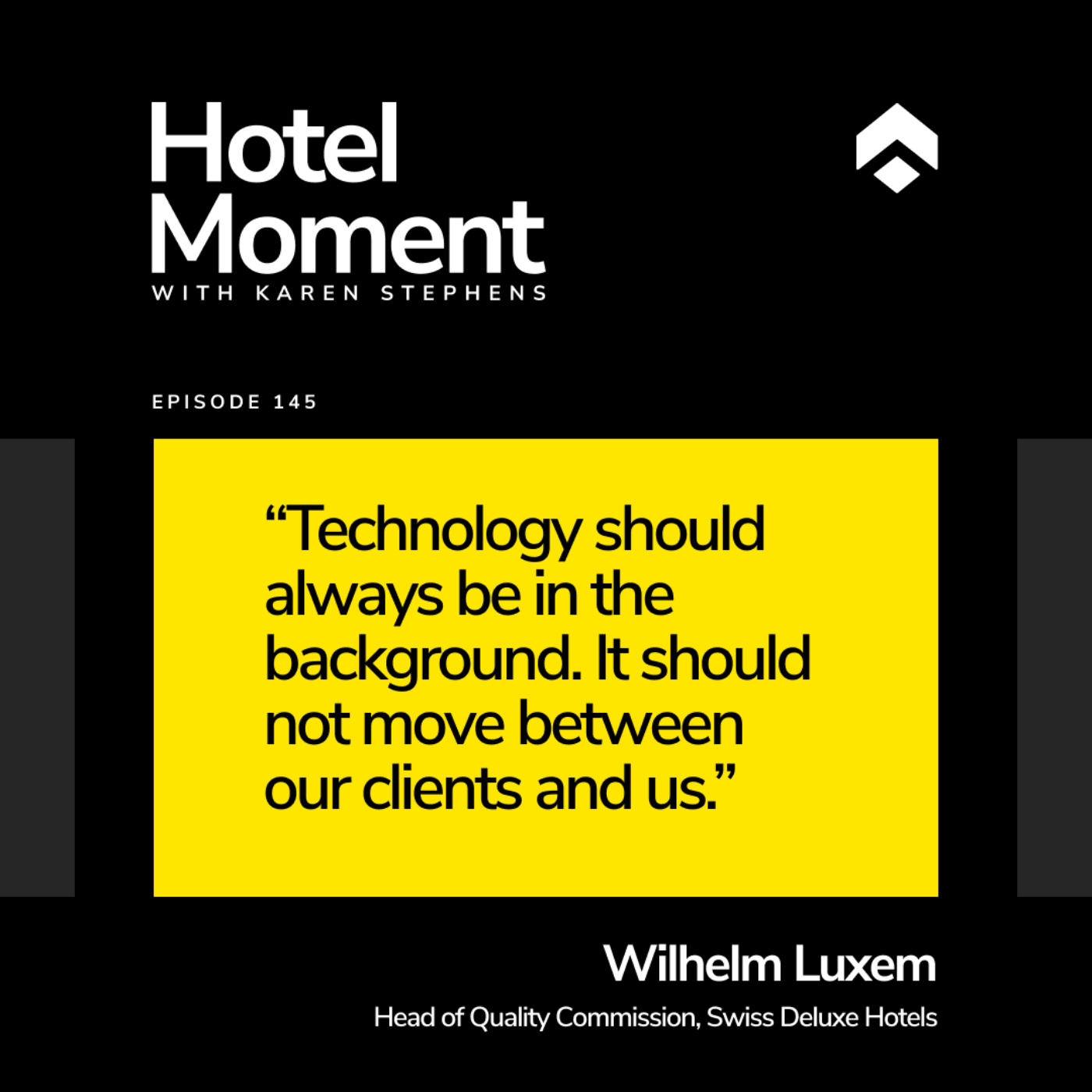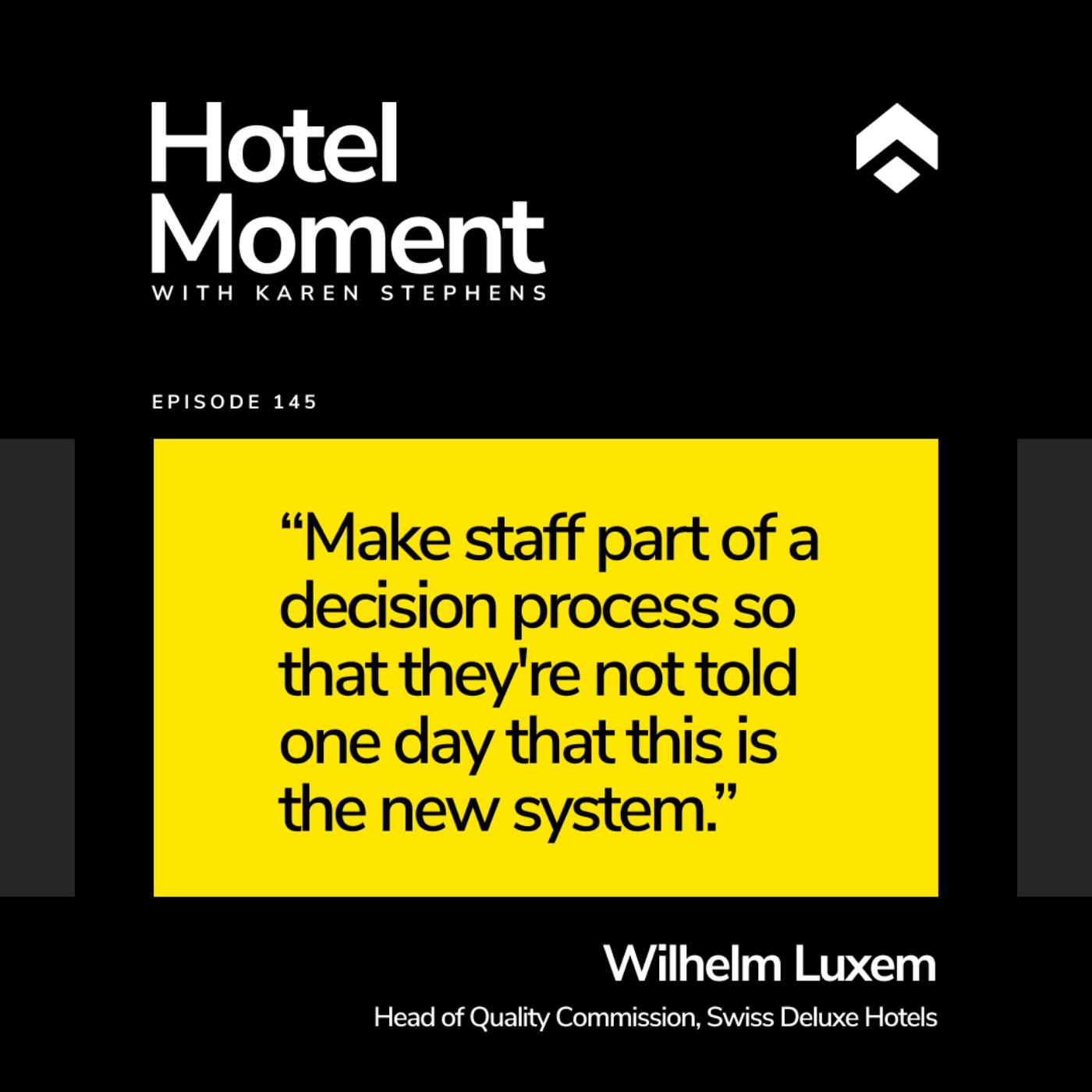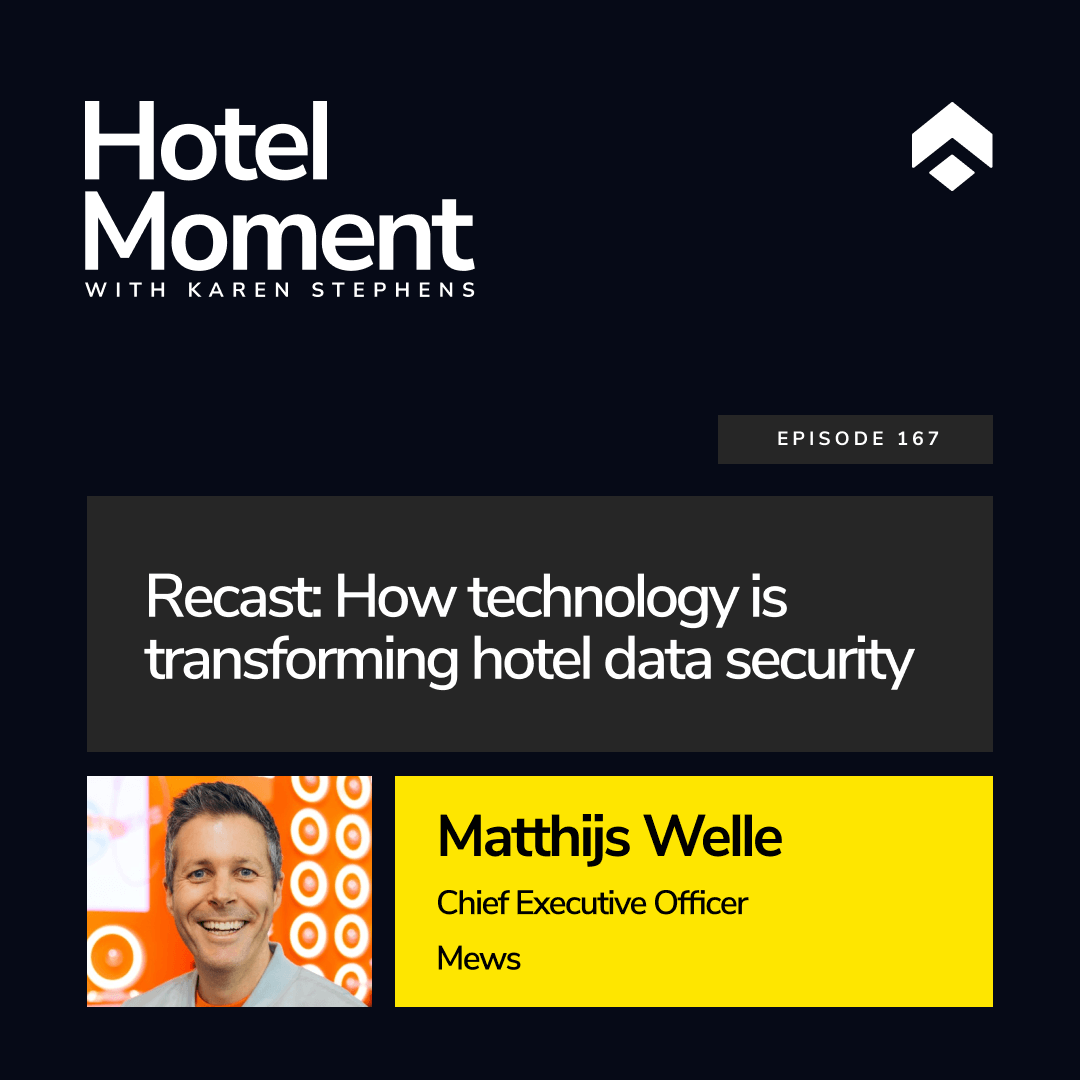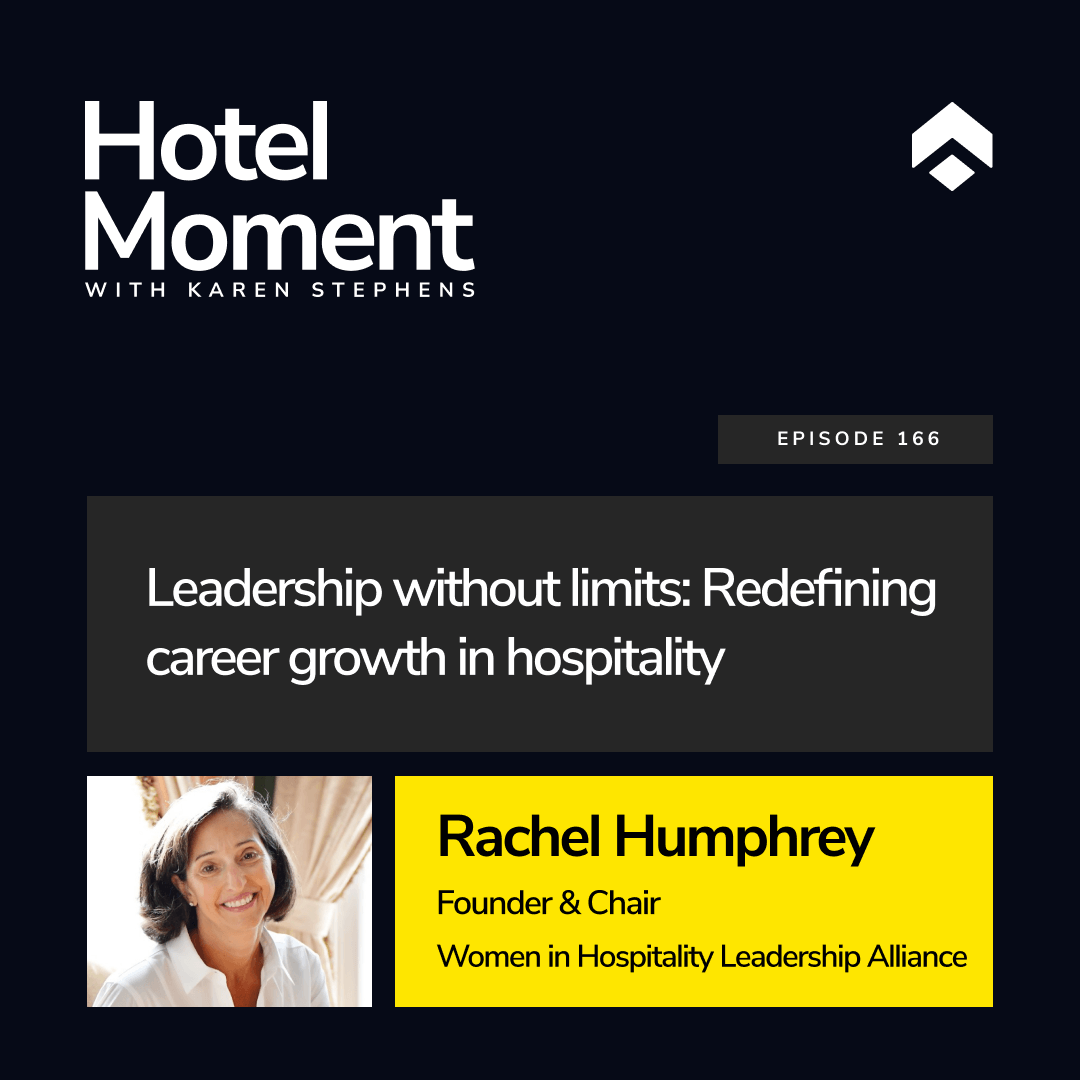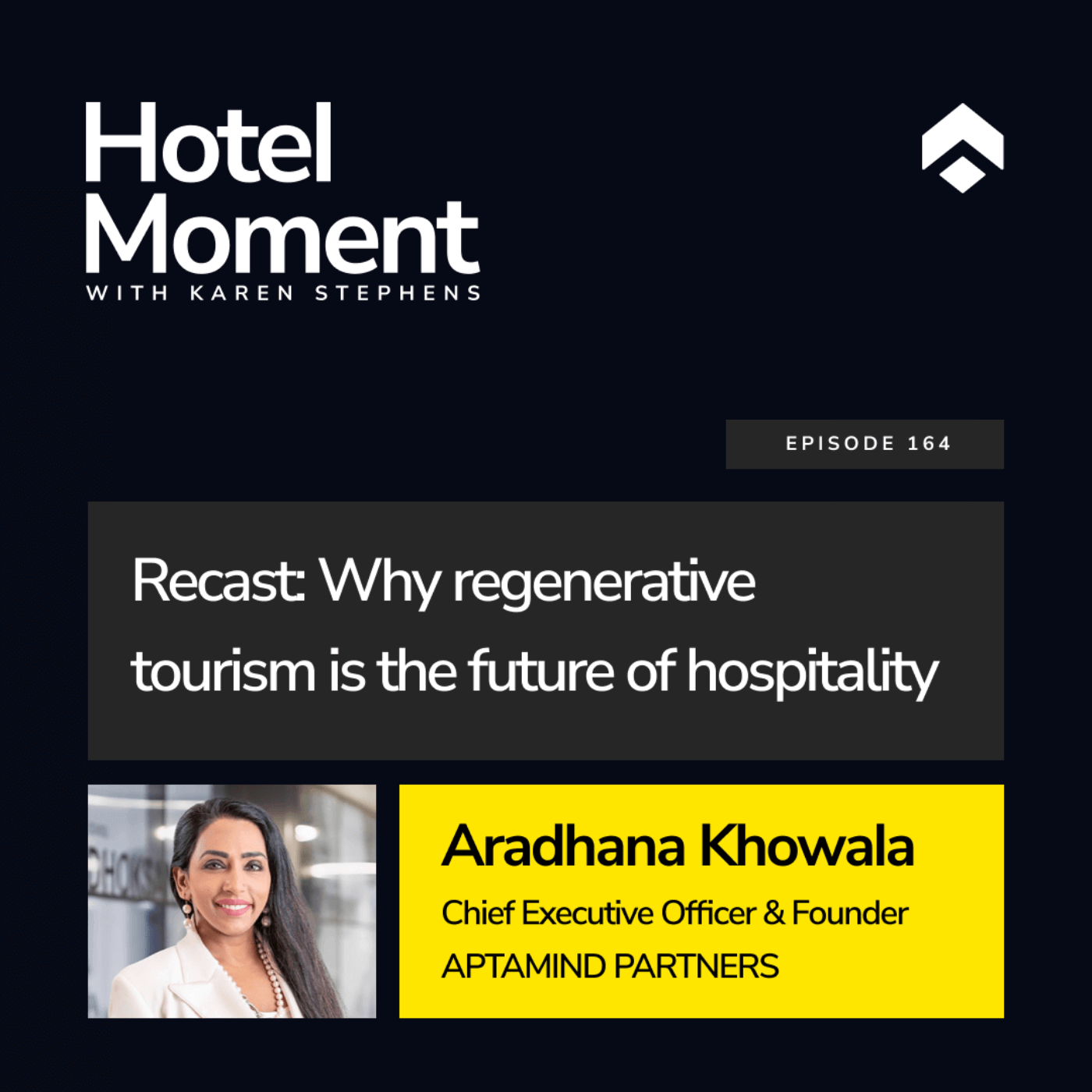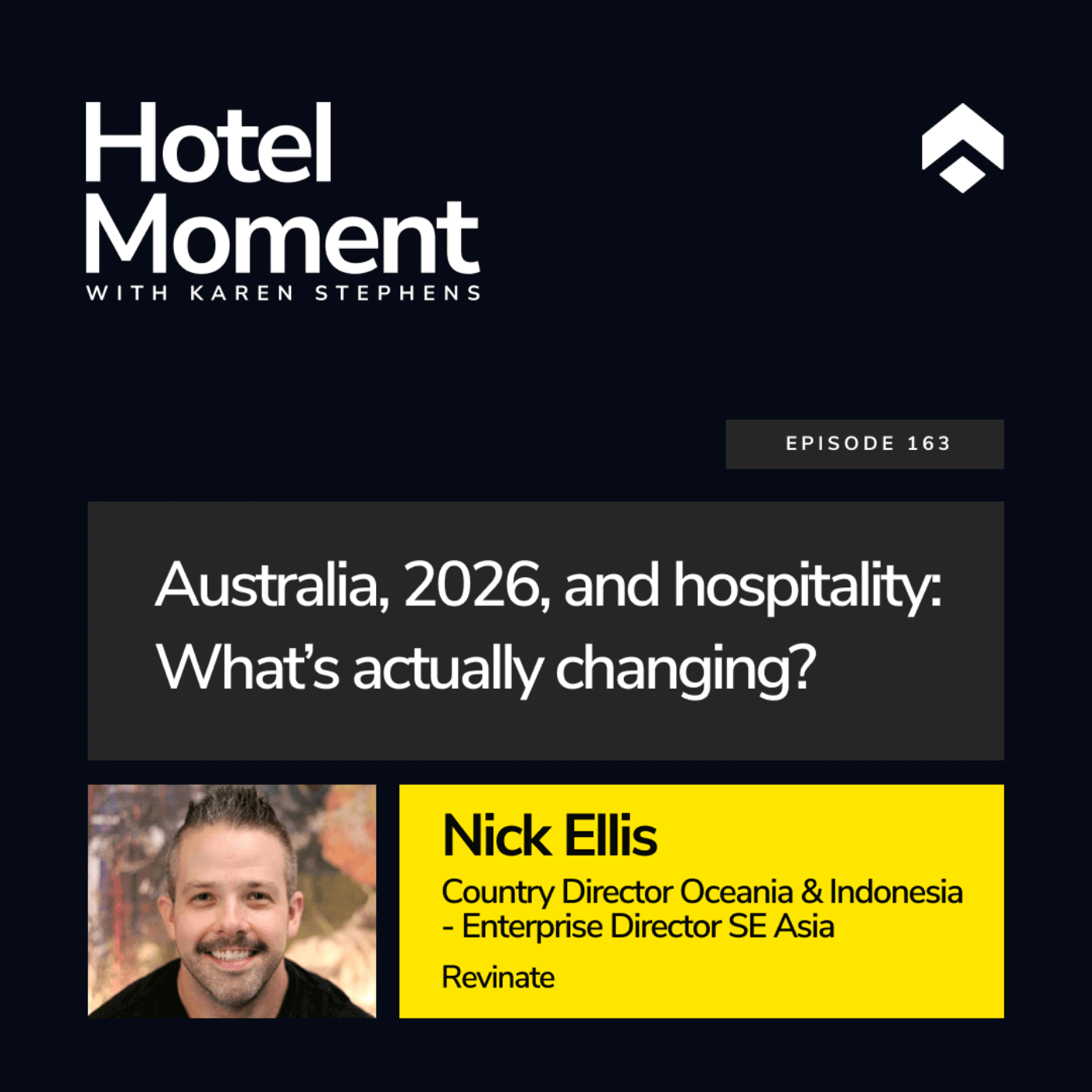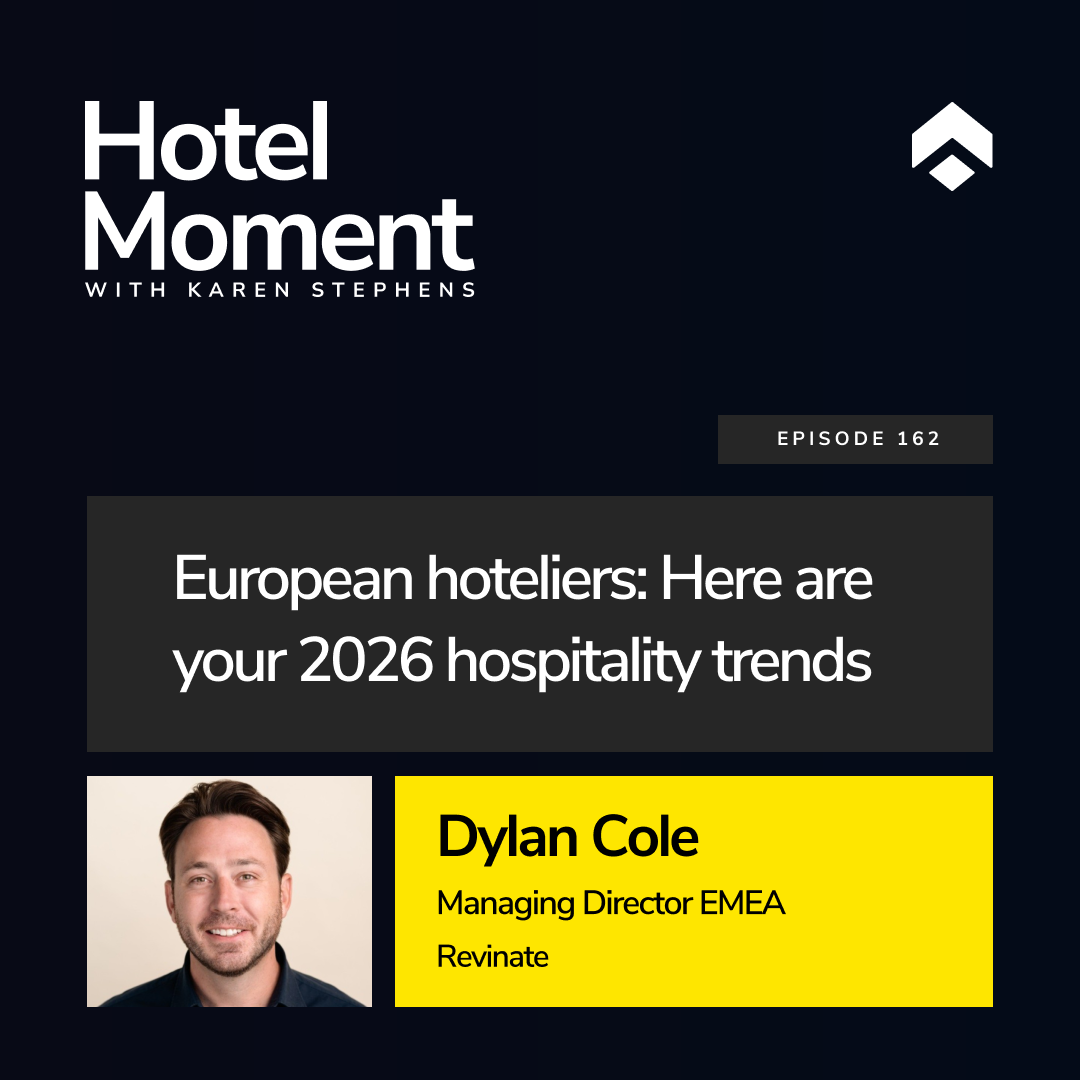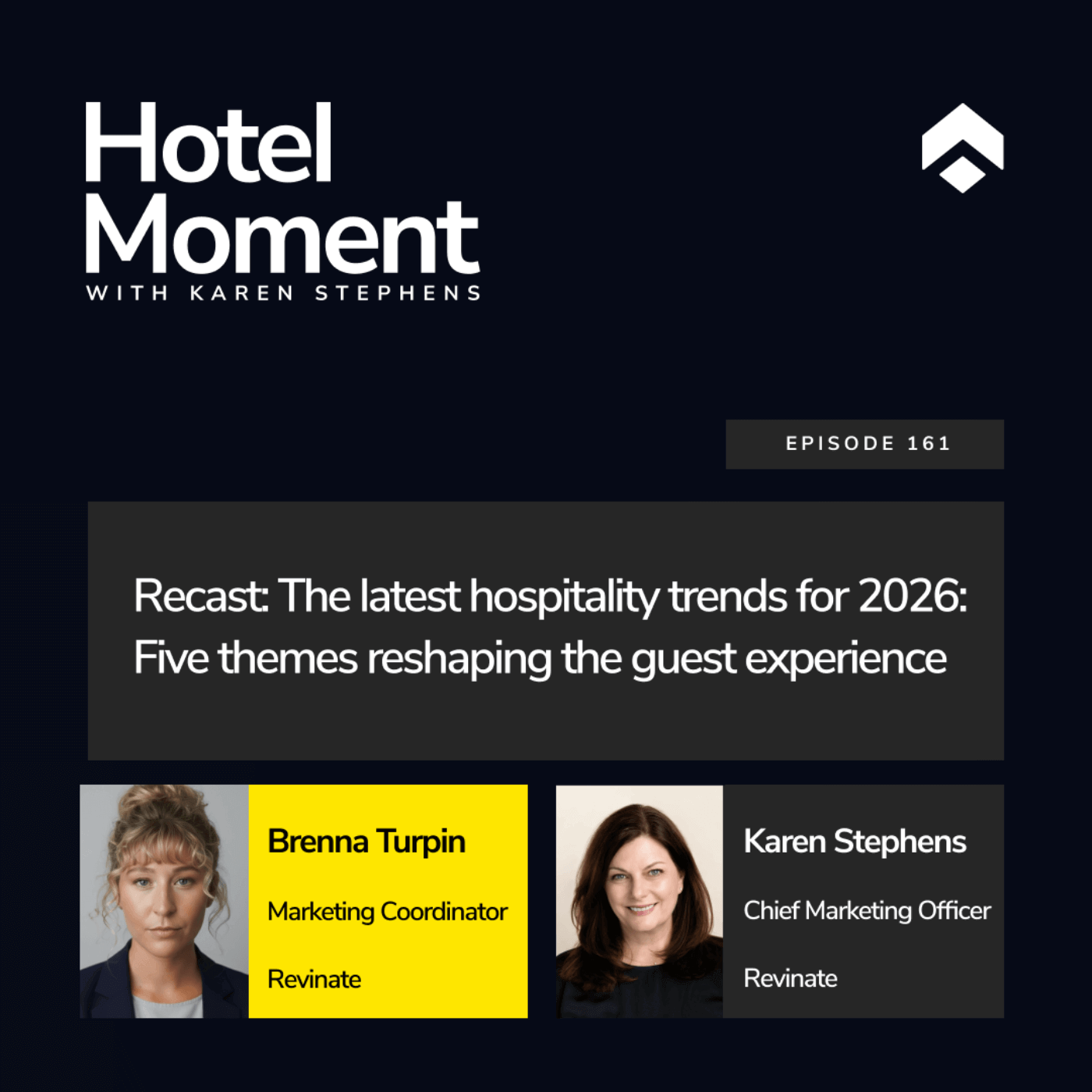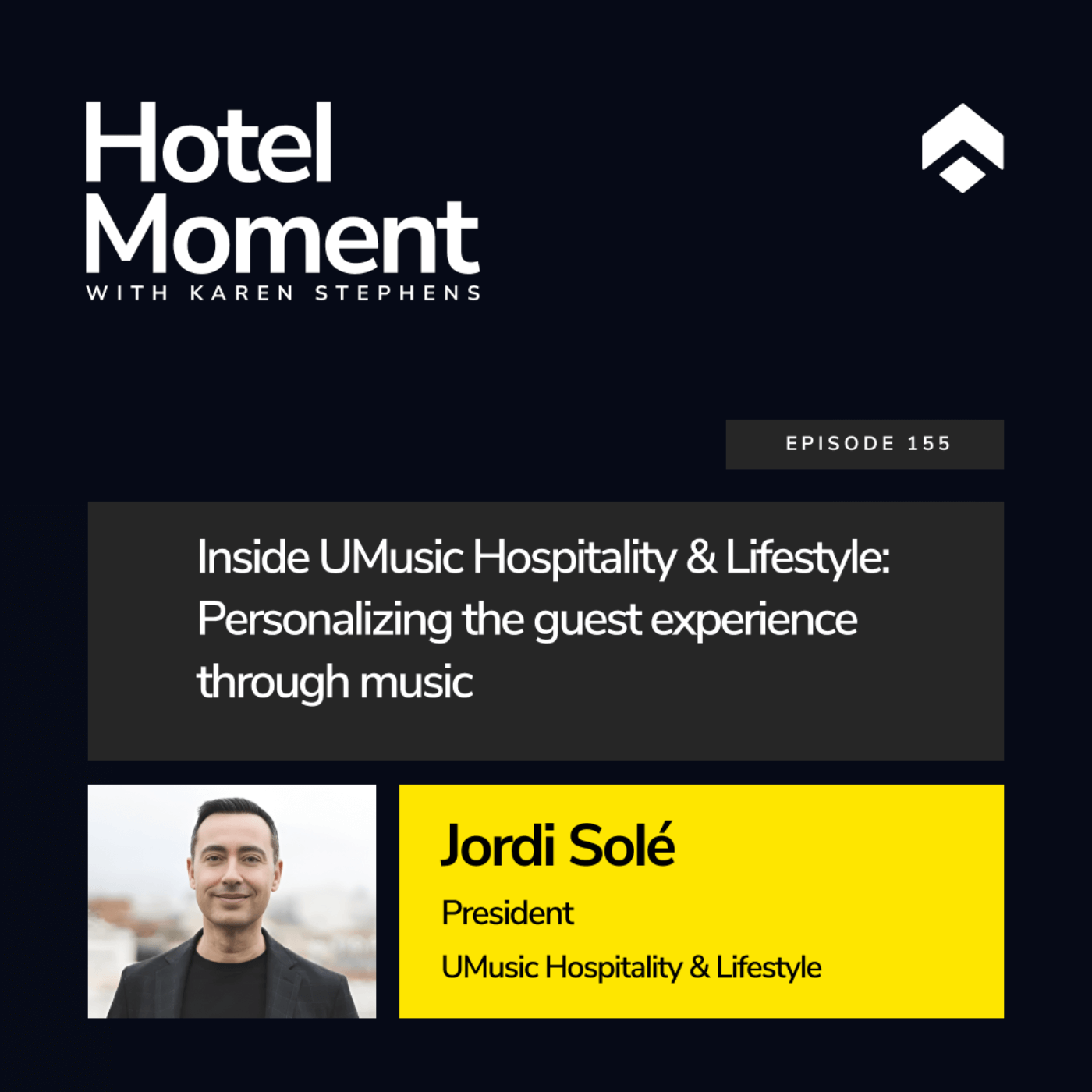Hotel Moment
WITH KAREN STEPHENS


Episode 145
How Swiss Deluxe Hotels redefines luxury hospitality with tech
In this week’s episode of Hotel Moment, Wilhelm Luxem, Head of Quality Commission at Swiss Deluxe Hotels, joins Revinate CMO Karen Stephens to share several reasons why hoteliers have the best of both worlds: embracing technology and honoring tradition.
Every hotelier is in a unique position to leverage technology as a competitive advantage while keeping the traditional, more human aspects of the guest experience alive. Wilhelm describes technology as a “complement” to hotel operations — something intrinsically part of hotel DNA that facilitates the true meaning of hospitality and solves its most pressing challenges.
Wilhelm lists several heuristics you can use to decide which technology is right for both your business goals and your hotel staff. Because in order to transform your hotel’s performance, every team member should be involved in technology decisions.
Tune in for an optimistic conversation on the real-world application of hotel technology that honors the traditional aspects of hospitality.
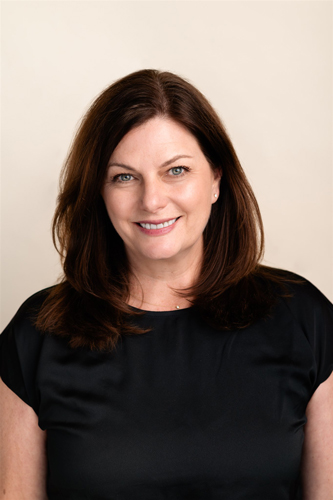
Meet your host
Karen Stephens
As Chief Marketing Officer at Revinate, Karen is focused on driving long-term growth by building Revinate’s brand equity, product marketing, and customer acquisition strategies. Her deep connections with hospitality industry leaders play a key role in crafting strategic partnerships. Karen has more than 25 years of expertise in global hospitality technology and online distribution — including managing global accounts in travel and hospitality organizations such as Travelocity and lastminute.com
As the host of The Hotel Moment podcast, she interviews top players in the hospitality industry. Karen has been with Revinate for over 11 years, leading our global GTM teams. Her most recent transition was from Chief Revenue Officer, where she led the team in their highest booking quarter to date in Q4 2023.
Watch the video
Transcript
[00:00:00] Wilhelm Luxem: The key element of those choices is always how can technology complement, first of all, our DNA, our service philosophy, and how can it improve our efficiency as an organization?
[00:00:18] Karen Stephens: Welcome to the Hotel Moment podcast presented by Revinate, the podcast where we discuss how hotel technology shapes every moment of the hotelier’s experience. Tune in for our guest episodes where we explore the cutting edge technology transforming the hospitality industry and hear from experts and visionaries shaping the future of guest experiences. Alongside our conversations with guests, we have episodes for you hosted by Revinator, Brenna Turpin, on resources available to you all. These resource packed episodes have granular advice on overcoming industry and operational challenges so you can emerge as a hotel superhero. Whether you’re a hotelier or a tech enthusiast, you’re in the right place. Let’s dive in and discover how we can elevate hospitality together.
Hello, and welcome to the Hotel Moment podcast. I am your host, Karen Stephens, the Chief Marketing Officer of Revinate. And today, we’re excited to speak with Wilhelm Luxem, a seasoned leader in luxury hospitality with an impressive background spanning multiple prestigious hotels and consulting ventures. Currently, Wilhelm is the Head of Quality Commission at Swiss Deluxe Hotels, where he helps uphold and refine the exceptional standards of the most renowned five-star hotels in Switzerland. Having led iconic properties such as Baur Au Lac, Wilhelm’s extensive experience in hotel operations, guest service, and strategic growth positions him as a thought leader in the industry. He also brings valuable insights as a consultant, advisor, and board member, continually shaping the future of luxury hospitality. Welcome to the podcast, Wilhelm. It’s a pleasure to have you here.
[00:01:55] Wilhelm Luxem: Well, thanks, Karen. Thanks for inviting me. It’s a pleasure to be in the program.
[00:01:59] Karen Stephens: So, Wilhelm, you’ve had a long impressive career in luxury hospitality. What do you love most about it, and what keeps your passion burning each and every day?
[00:02:08] Wilhelm Luxem: That’s very simple. It’s people. Hospitality is all about people, and you gotta have that passion for people. If I say people, it’s on both sides. It’s, of course, the clients, but it’s also your team, your partners in the industry, your suppliers. It always comes down to people, and that’s what really triggered me to stay in this industry for fifty years now.
[00:02:30] Karen Stephens: Fifty years. So at the moment, you are with Swiss Deluxe Hotels. So can you talk a little bit about that organization? Because for our listeners who aren’t familiar with it, it’s truly fabulous.
[00:02:40] Wilhelm Luxem: Swiss Deluxe Hotels is an association of the 43, let’s say, top hotels in Switzerland, all five-star superior properties. Many of them private properties with a long history, many family-owned. So it’s a group of very independent hotels with a long history and a very distinct identity and very authentic places, in fact.
[00:03:05] Karen Stephens: And you were also the GM of one of those beautiful hotels. Can you talk a little bit about the Baur Au Lac?
[00:03:10] Wilhelm Luxem: Well, I was the GM. I retired. I took for retirement three years ago and handed over to my successor. I’m still on the board of the Baur Au Lac, which, of course, is a very iconic hotel. It’s one of those hotels that are in the same family. And this one actually for seven generations, which is quite unique in the world, especially in today’s world where, you know, ownerships change sometimes very quickly. The Baur Au Lac has been for seven generations. Well, actually, it has been created by the owning family. It has never been sold. In that sense, it’s a true, not only iconic hotel in its quality, but also in its continuity over centuries.
[00:03:50] Karen Stephens: So that is 100% on my bucket list to go stay in that hotel, and I really encourage our listeners. We’ll put links in the show notes, but what an amazing property. And, really, I think when you think of luxury hotels and hospitality, like, really the roots of hospitality, that is such an iconic property to kind of reference. So absolutely beautiful.
[00:04:10] Wilhelm Luxem: Yeah. And it’s actually a very good example as a hotel that obviously started in 1844. And you can imagine when it comes to technology, when it comes to the environment, distribution, all the elements that keep us busy every day, the situation was very different. But what was the same is the guests of those days and the guests of today had very high expectations. And the challenge is or the question is, how can we deliver this ever-changing and ever-higher expectations that evolve over times? When it comes to hardware, it means size of rooms, renovations, integration of new ideas, and then services. But it’s always been sort of a campaign by technology. Imagine in 1844, you could advertise that you have a common bathroom on the same floor. And only a few decades later, you could advertise that you have a private bathroom, and you have even running hot and cold water and heating. This was absolutely luxurious in those days. Our days, of course, these are taken for granted. But the key is that you always evolve with technology and with evolution of guest expectations.
[00:05:23] Karen Stephens: Absolutely. So how do you view tech adoption in luxury hotels, particularly in the Switzerland area? But overall, how do you view that? You just mentioned how things evolve as we go. Obviously, in 2025, it’s moving at a clip. I think we always say that technology evolves quickly, but I think we’re in a period now where it’s quicker than ever. So how do you view tech adoption?
[00:05:44] Wilhelm Luxem: Yeah. You’re right. It’s going quicker than ever. So first of all, you have to make good choices because there’s so many choices out there. So you have to put a few filters on it to make sure you get the right choices because you can only spend your money once. But the key element of those choices is always how can technology complement, first of all, our DNA, our service philosophy, and how can it improve our efficiency as an organization because technology should always be in the background. It should not move in between our clients and us. To the contrary, it should free up time so we have more time to spend with guests and service them because technology is doing all the nitty-gritty administrative processing that would only take time from the team. So this, for me, is one of the key elements when making choices in technology.
[00:06:38] Karen Stephens: Yeah. So I’ve heard you talk a little bit about the filtering. So we can we go a little bit farther down that? So when you say you need to filter for your choices, obviously, we have limited budgets, we have limited time. So what’s your approach to making sure that technology is selected properly?
[00:06:52] Wilhelm Luxem: Well, obviously, you stay tuned with the market. You have good consultants that give you advice in what’s new, what is suitable for your organization, then you obviously have to check how does it complement your existing infrastructure, then it’s also important to to see, is it something that will be able to evolve over times, or do you invest in something that will sort of be a kind of a dead road? It’s very important these days that you have systems that are open in terms of evolution and progress, the connectivity. And then what I feel is also very important, how easy is the implementation when it comes to staff? Because this is sometimes an underestimated challenge. How is the acceptance in the team? How is the training process? And I think the best is if you don’t need huge classroom, uh, frontal training, but if you have systems that have kind of intuitive systems where you can learn almost on your own, because this is what people are used nowadays, especially young people. They don’t want to read introduction speaks. They do it intuitively, and they play with it. And I think this is a very good way to progress fast in the use of of systems.
[00:08:07] Karen Stephens: Yeah. I think that’s exactly right. I actually saw that you said once that if it takes more than two weeks to train staff, you’ve picked the wrong product.
[00:08:15] Wilhelm Luxem: Well, I would repeat this.
[00:08:17] Karen Stephens: And that even seems like kind of a long time. So.
[00:08:20] Wilhelm Luxem: Yeah. It’s not only because you waste valuable time. I think you also come quickly to a point where people will be frustrated because they feel it’s too complicated, and then all the rejection processes started rather than having an excitement. “Oh, this works. This seems to be interesting. Let’s go deeper into it. Let’s learn more about it.” You have to excite people about systems.
[00:08:41] Karen Stephens: Yeah. Absolutely. And I think you’re right with the generations that are coming up now. Certainly, I mean, even people who are 30, 40, they’ve come up with technology their whole lives, and all of the interfaces are very easy to use. So when you think about helping hoteliers think about hiring for talent, how do you ensure that the right people are paired with the right technology? So what key traits do you look for in candidates to make sure that they’re gonna be a good fit?
[00:09:05] Wilhelm Luxem: Obviously, it depends on which sector or which department you are talking about. I strongly believe in starting with the attitude. You, first of all, need people who have the right attitude because when it comes to skills, that’s something you can train. And, obviously, for someone who has needs more skills for technology as opposed to someone who is more hands on job like in the kitchen or maybe in service, obviously, you have to differentiate that. But the general aspect for me is always the attitude that people are not only ready to serve, but also open-minded to learn. If you have this attitude of I’m interested, I’m curious to learn, then you can progress quickly. But if there’s this kind of blockage where people feel like, you know, I know it all or maybe also a fear of learning for new things, that’s difficult.
[00:09:55] Karen Stephens: Absolutely difficult. And I think as we talked about the pace at which things are evolving, I think no matter what sector you’re in, certainly working for a technology company, in a marketing team, like, every day, there’s new ways of doing things that are completely different than how it’s been the twenty years prior. So I can only imagine, you know, in hospitality, it’s similar.
[00:10:14] Wilhelm Luxem: I think it’s a matter of a good project management. If you introduce new systems, I believe it’s very good to involve the people concerned at a very early stage. Make them part of a decision process so they’re part of the decision. They’re not told one day, this is the new system. Just take it. Involve them. They will then be much more engaged, and they will also be much more understanding of the opportunities of the system rather than seeing something new that creates fear and resistance. So we are early in the involvement. And then, of course, not everybody will be on the same level of of learning. So I think the project manager of the introduction period should understand that and should address sort of training needs individually so that everybody can dive into with their own speed.
[00:11:03] Karen Stephens: Very important. I love the idea of having a project manager that’s just focused on that. You think about the investments that hotels make in technology, and it’s kind of crazy if you just throw the system over the fence and expect everybody to come up to see you right the same.
[00:11:17] Wilhelm Luxem: Well, it comes back to what I said early in our industry. It’s about people. If you have a project manager that is just a tech guy because he knows it, and for him, it seems so easy. But he has to understand I have a a human being in front of me who doesn’t know the system, who is very willing to learn, but who just doesn’t know. So if I come with my I know it all and it’s so easy approach, then I may not open his mind rather than first engaging him with small steps that he feels or she feels, oh, it’s easy. And, additionally, it’s interesting. I learned something now, and, uh, I can see. I can solve problems with it. Oh, great. Let’s go further. So, really, you have to take people on the hand. It comes back to like people.
[00:11:58] Karen Stephens: Yep. Exactly. And that’s why we’re in the business. I mean, certainly, hospitality is the core of that. We started talking a little bit about Borolac and the fact that it’s been around since the 1840s and how guest expectations have changed from running water, etc., to everything today. So can you talk a little bit about how you think things are gonna evolve in terms of guest expectations in the luxury sector over the next, call it, ten years? What’s your kind of crystal ball for how it’s evolving now?
[00:12:26] Wilhelm Luxem: Obviously, the ten years is a long period of time. But what we have seen in the past years, and it has probably been accelerated in recent years, is that people are shifting away from a materialistic approach, their glitzy, uh, marble and golden water taps, towards more of an experience, towards more of a very personalized service of a very strong recognition, respect for the guest, and each one very individually rather than all the glamour and the sort of the, yeah, more materialistic aspects. I think this is really shifting. People appreciate that you take the special needs very serious. You come up with very individual solutions. I think this is really a shift that we can see already very strongly, and I think this will continue. And why do I say this? On one side, we live in a more and more technology-driven society. Everything gets digital, but we know how important it is for us when we have a problem. And we would like to have someone on the phone to talk to. We have to talk to a chatbot or we have to talk to all kinds of systems. It seems impersonal. But hospitality, I think and this is, I think, the great opportunity for us. I’m very optimistic that the greatest time of hospitality is actually ahead of us because we are a sort of a bubble, kind of a land of real analog connections. People can still meet in person. Key people can have a drink on the bar. They can meet in a restaurant. They meet at the reception. Even so, all the processing and the administrative stuff should be done before. We should not spend time with the guest when he arrives with nitty gritty administrative stuff. That should be done. This is where technology can really help us throughout the whole guest journey. So this freed up time, we should really invest in engaging with the guest and really understanding them, respecting them, and helping them to have a unforgettable experience. I think this is really the trend, and I think we will see more of it because technology sometimes can take us away from the clients physically rather than helping us to understand the needs and then make sure the right people deliver these needs.
[00:14:44] Karen Stephens: Yeah. Absolutely. I wanna kinda circle back on a couple things you said there. I think it’s so important as you’re mentioning technology enabling humans to deliver that experience. You mentioned the voice channel. I think a lot of people say, oh, all of the it’s gonna be chatbots and AI for everything. And I firmly believe, especially in the luxury sector, you will always have that guest that wants to make that phone call, talk to a person, and get their issue resolved or make that booking or understand how they can have the best vacation ever. The technology should enable the agent, but not get between the agent and the customer.
[00:15:21] Wilhelm Luxem: Yeah. There are these times where technology in direct use can be very helpful for guests. Let’s take the example of a hotel concierge. If you look at it, you could think, or maybe tomorrow, we don’t need anymore a concierge. This is true in a sense that a lot of resourcing of information that the concierge was sort of the guardian, the man, the woman who knew it all. Now a lot of this information can be found on the Internet or even this AI. So the customer will confront the hotel staff, the concierge in that instance, with much more information because he has already Googled. He has already found out the five top Italian restaurants in town. But now the concierge can come into the situation, say, yes, but this one, which seems to be the best one, has this and this downside. I would rather recommend this one. And, actually, they are always very busy. But I know the owner. I know the manager. I just give them a call. I’m sure they will find a table for you. You know, it’s this time of personalized service that you cannot find online. And this is just a very basic example, but this is where we have to understand, yes, the client uses also the technology. So where is the gap that we can close with humans?
[00:16:33] Karen Stephens: With humans. Right. With that personalized experience from start to finish throughout the guest journey. I think that’s really key. Everything that you’re doing pre communication before the guests arrive on property, then how you service the guest all the way through post stay. And I’m glad that we agreed that technology is there to enable and and still humans delivering the best parts. So you mentioned that you retired a few years ago from your position as GM, and now you’re doing a lot. You’re working obviously with Swiss Deluxe Hotels. Can you also talk a little about about your involvement with the European Hotel Managers Association and with EHL? What is that, and what are you doing now?
[00:17:09] Wilhelm Luxem: Yeah. The European Hotel Manager Association is an association of close to 500 hoteliers throughout Europe. So it’s not the hotel that is a member. It’s really the hotelier as a person that becomes member. It’s mainly a network of people. We exchange ideas. We can phone each other if you have a question or it’s a lot about staffing, of course. When, you know, someone moves on in his career, I might have a very good person in my team, but I just because I’m in a international hotel, I cannot offer him the next position that he’s ready to take on. So before he just sort of disappears from the market somewhere else, I rather like to keep him within the network of the European hotel manager association. So this is just one example. But, of course, we exchange also ideas when it comes to suppliers. We work together to get better prices. We talk about technology, and we have once a year an international conference changing location every year. This year, it was in Warsaw. The year before, it was in Venice. Next year, we will meet in London. But then we have also the national chapters, and I am heading the Swiss chapter. And we’re doing also conferences within our chapter. So our next lunch amicala, how we call it in Switzerland, is about AI and how can we apply it in hotels. You know? So so we we always try to get a keynote speaker to talk about interesting subjects.
[00:18:34] Karen Stephens: That’s wonderful. That’s really cool. And what is EHL?
[00:18:37] Wilhelm Luxem: EHL is the Ecole Hotelier de Lausanne. It’s the hotel school of Switzerland and probably the most recognized hotel school in the world. They are really leading institution in informing future management for the hotel industry. And what is a fantastic compliment is that many of the diplomas of the EHL are actually not working in hotel industry, which at the first glance, you could think, oh, this is a pity. But it shows that actually the training and the studies in hospitality grooms you to take many different jobs in any kind of service industry from luxury brands, retail, finance institutions. So this is a very versatile sort of studies which developed a personality, developed a sense of service. Because the school is so international, there are students from all over the world. So there’s always a mixture of languages you hear when you’re there on the campus. Just this, you know, makes it a very exciting institution.
[00:19:44] Karen Stephens: Wow. That is so cool. We’ll provide links to that as well. And do you have involvement? Do you teach courses there, or how are you involved?
[00:19:50] Wilhelm Luxem: No. I don’t give courses. I’m involved with both the Swiss deluxe hotels and also with the European hotel manager association. When we meet young talents there to exchange ideas, we always invite a group of young talents from EHL to our annual conferences of the European Hotel Manager Association, but also with Swiss deluxe hotels where we invite them to meet hotel managers. And so networking actually with them and giving them opportunities to meet people with a lot of experience in the industry.
[00:20:20] Karen Stephens: Wonderful. So your next generation of hoteliers that are intermixing
[00:20:24] Wilhelm Luxem: Absolutely. It’s about tutoring. It’s about mentoring. It’s about giving advice. It’s about opening doors for the first job, but also for work placement opportunities. So it’s very versatile.
[00:20:36] Karen Stephens: That’s wonderful. And what’s next for you and for Swiss Deluxe Hotel? So are there any exciting projects or initiatives that you’re involved in now?
[00:20:44] Wilhelm Luxem: There’s no actual project in view, but, of course, my role is the quality assurance. So, obviously, this is key to make sure that all properties are maintaining high quality. And the way if I say high quality, it’s on three levels. It’s obviously investments. We look very closely. Are they investing enough to stay up to the expectations of the five star deluxe market? But then we look at how do they score in in mystery shopping, LQA results, etcetera. And we look also in the GSS performance, the guest feedback, obviously, and how it is looked at, not just compiling it, but how is it looked at, and how is it used to ever improve services.
[00:21:28] Karen Stephens: That’s fantastic. So I’ve got one last question for you. You’ve worked in a variety of luxury properties and brands over your career. What advice would you give to hoteliers who wanna create a truly exceptional guest experience that stands out in an ever increasingly competitive market?
[00:21:44] Wilhelm Luxem: Well, get the best team in town. That’s for sure. Get the best talent, people for people. Give your talents wind under the wings so they can fly, you know, give them really support them. You obviously spend a lot of time recruiting them to make sure you get the right talents. But once you have them, make sure they stay with you. I think this is key. And I think, as I would tell you, we should never forget to spend enough time with our guests as well because this is the best way to understand their needs. And if there is a problem, that we make sure the problem is never leaving the hotel. It’s solved before the the customer leaves the hotel.
[00:22:19] Karen Stephens: Wonderful. Well, thank you, Wilhelm. It’s been a pleasure to have you, and I wish you the best of luck with all of your organizations and Swiss deluxe hotels.
[00:22:26] Wilhelm Luxem: Well, thanks, Karen. It’s been a pleasure, and nice to meet you, and have a wonderful day.
[00:22:34] Karen Stephens: Thank you for joining us on this episode of Hotel Moment by Revinate. Our community of hoteliers is growing every week, and each guest we speak to is tackling industry challenges with the innovation and flexibility that our industry demands. If you enjoyed today’s episode, don’t forget to subscribe, rate, and leave a review. And if you’re listening on YouTube, please like the video and subscribe for more content. For more information, head to revinate.com forward /hotel moment podcast. Until next time, keep innovating.

